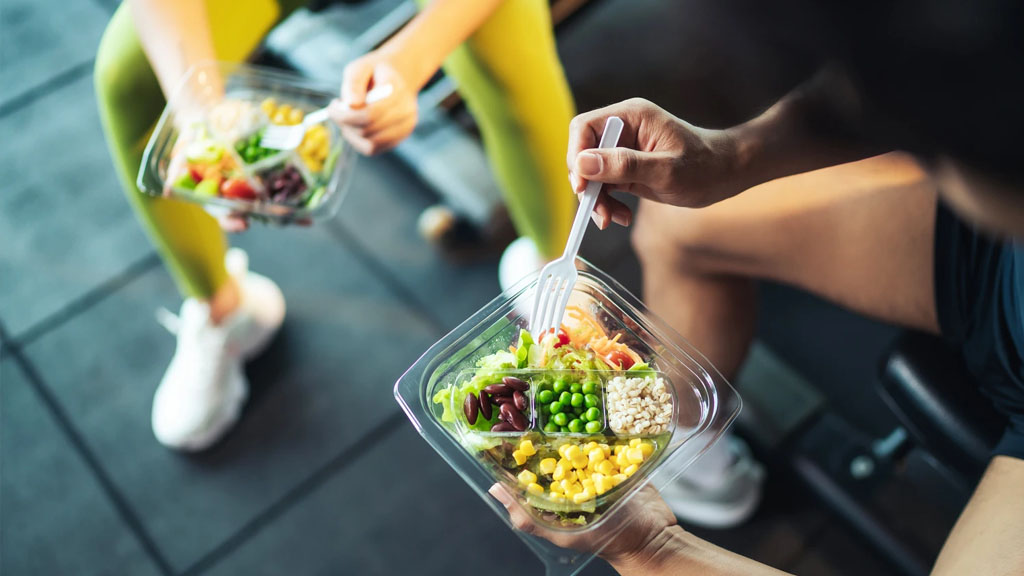Proper nutrition plays a crucial role in maximizing results from strength training. Whether your goal is to build muscle, increase strength, or improve performance, what you eat directly affects your progress, energy levels, and recovery time.
Below is a complete guide to fueling your body effectively for strength-focused workouts.
🔹 Why Nutrition Matters in Strength Training
When lifting weights or engaging in resistance training, your muscles experience microtears. Proper nutrients help repair, rebuild, and grow those muscles stronger. Additionally, good nutrition:
- Enhances performance during workouts
- Reduces fatigue and injury risk
- Accelerates recovery
- Supports hormonal balance and immune function
🔹 Macronutrients Breakdown
1. Protein – Muscle Repair and Growth
- Recommended intake: 1.6–2.2 g per kg of body weight daily
- Sources: Chicken, eggs, fish, Greek yogurt, cottage cheese, tofu, legumes, protein shakes
- When to eat: Spread evenly throughout the day, especially post-workout to support recovery
2. Carbohydrates – Energy for Training
- Carbs are your body’s main energy source during high-intensity training
- Sources: Rice, oats, potatoes, fruits, whole grains, pasta, quinoa
- Eat complex carbs for sustained energy and simple carbs post-workout to replenish glycogen stores
3. Fats – Hormonal and Joint Support
- Don’t avoid fats — they are essential for hormone production and overall health
- Sources: Nuts, seeds, avocados, olive oil, fatty fish
- Aim for healthy fats while limiting trans fats and excessive saturated fat
🔹 Pre-Workout Nutrition
Goal: Fuel your session without feeling too full
Ideal timing: 1–2 hours before training
What to eat:
- Complex carbs + moderate protein
- Example: Oats with banana and whey protein, or chicken with brown rice
Avoid high-fat or very heavy meals too close to your workout.
🔹 Post-Workout Nutrition
Goal: Rebuild muscle and replenish glycogen
Eat within 30–60 minutes post-training.
What to eat:
- Fast-digesting protein (e.g. whey)
- Quick carbs (e.g. banana, rice cakes, white rice)
- Optional: Creatine or electrolyte drink
Example meal: Grilled chicken, white rice, steamed vegetables, protein shake
🔹 Supplements (Optional but Helpful)
- Whey protein: Convenient protein source
- Creatine monohydrate: Supports strength and performance
- BCAAs: May help reduce muscle soreness (especially on a cut)
- Multivitamins & Omega-3s: Fill nutritional gaps
🔹 Hydration
Strength training increases water loss through sweat.
- Aim for 2.5–3.5 liters per day, more on training days
- Add electrolytes if sweating heavily or training in heat
🔹 Sample Daily Meal Plan
Breakfast: Scrambled eggs, whole grain toast, avocado
Snack: Greek yogurt with berries and honey
Lunch: Chicken breast, quinoa, steamed broccoli
Pre-Workout: Banana + peanut butter on rice cakes
Post-Workout: Whey protein + white rice + tuna or lean meat
Dinner: Salmon, sweet potato, green salad
Evening snack: Cottage cheese or casein protein
Final Tips
- Eat enough: Under-eating can stall muscle growth and recovery
- Don’t fear carbs: They’re vital for strength and endurance
- Track your intake if needed, especially for body composition goals
- Consistency > Perfection — aim to fuel your body well most of the time

